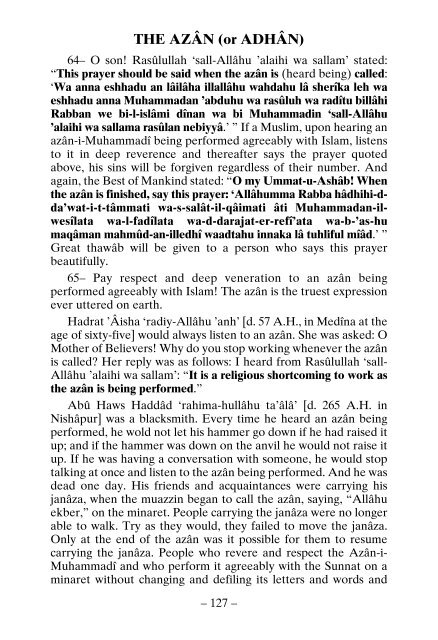O Son !
THE BOOK ‘O SON’ Al-hamdu lillâhi Rabbil ’âlamîn. Wa-s-salâtu wa-s-salâmu ’alâ Rasûlinâ Muhammadin wa Âlihi wa Sahbihi ajma’în. 1– O son! Collecting from books written by the scholars of the Hanafî Madhhab three hundred and sixty hadîth-i-sherîfs and forty-four khabars and also the seven essentials and the five rukns and the seven wâjibs and the fourteen sunnats and the twenty-five mustahabs and the fourteen mufsids of namâz, I have explained them for you. Adapt your acts and deeds to these teachings so that you attain fayz and nejât (salvation)! 2– Also for your information, I have collected a thousand and ninety âdâb (adabs) for you and for other young Muslims like you. If you adapt your actions and acts of worship to these teachings, they will be sufficient for you. If you laze, disobey Allâhu ta’âlâ and cease from these practices and manners, you will be afflicted with slavery and disgrace in the world and subjected to torment in the world to come. If you live up to them and advise your Muslim brothers to do the same, it will be useful for you. They will say blessings over you. And Haqq ta’âlâ will accept their invocations. For, a slave will be pardoned on account of another slave’s invocations for them.
THE BOOK ‘O SON’
Al-hamdu lillâhi Rabbil ’âlamîn. Wa-s-salâtu wa-s-salâmu ’alâ
Rasûlinâ Muhammadin wa Âlihi wa Sahbihi ajma’în.
1– O son! Collecting from books written by the scholars of the
Hanafî Madhhab three hundred and sixty hadîth-i-sherîfs and
forty-four khabars and also the seven essentials and the five rukns
and the seven wâjibs and the fourteen sunnats and the twenty-five
mustahabs and the fourteen mufsids of namâz, I have explained
them for you. Adapt your acts and deeds to these teachings so that
you attain fayz and nejât (salvation)!
2– Also for your information, I have collected a thousand and
ninety âdâb (adabs) for you and for other young Muslims like you.
If you adapt your actions and acts of worship to these teachings,
they will be sufficient for you. If you laze, disobey Allâhu ta’âlâ
and cease from these practices and manners, you will be afflicted
with slavery and disgrace in the world and subjected to torment in
the world to come.
If you live up to them and advise your Muslim brothers to do
the same, it will be useful for you. They will say blessings over you.
And Haqq ta’âlâ will accept their invocations. For, a slave will be
pardoned on account of another slave’s invocations for them.
Create successful ePaper yourself
Turn your PDF publications into a flip-book with our unique Google optimized e-Paper software.
THE AZÂN (or ADHÂN)<br />
64– O son! Rasûlullah ‘sall-Allâhu ’alaihi wa sallam’ stated:<br />
“This prayer should be said when the azân is (heard being) called:<br />
‘Wa anna eshhadu an lâilâha illallâhu wahdahu lâ sherîka leh wa<br />
eshhadu anna Muhammadan ’abduhu wa rasûluh wa radîtu billâhi<br />
Rabban we bi-l-islâmi dînan wa bi Muhammadin ‘sall-Allâhu<br />
’alaihi wa sallama rasûlan nebiyyâ.’ ” If a Muslim, upon hearing an<br />
azân-i-Muhammadî being performed agreeably with Islam, listens<br />
to it in deep reverence and thereafter says the prayer quoted<br />
above, his sins will be forgiven regardless of their number. And<br />
again, the Best of Mankind stated: “O my Ummat-u-Ashâb! When<br />
the azân is finished, say this prayer: ‘Allâhumma Rabba hâdhihi-dda’wat-i-t-tâmmati<br />
wa-s-salât-il-qâimati âti Muhammadan-ilwesîlata<br />
wa-l-fadîlata wa-d-darajat-er-refî’ata wa-b-’as-hu<br />
maqâman mahmûd-an-illedhî waadtahu innaka lâ tuhliful mîâd.’ ”<br />
Great thawâb will be given to a person who says this prayer<br />
beautifully.<br />
65– Pay respect and deep veneration to an azân being<br />
performed agreeably with Islam! The azân is the truest expression<br />
ever uttered on earth.<br />
Hadrat ’Âisha ‘radiy-Allâhu ’anh’ [d. 57 A.H., in Medîna at the<br />
age of sixty-five] would always listen to an azân. She was asked: O<br />
Mother of Believers! Why do you stop working whenever the azân<br />
is called? Her reply was as follows: I heard from Rasûlullah ‘sall-<br />
Allâhu ’alaihi wa sallam’: “It is a religious shortcoming to work as<br />
the azân is being performed.”<br />
Abû Haws Haddâd ‘rahima-hullâhu ta’âlâ’ [d. 265 A.H. in<br />
Nishâpur] was a blacksmith. Every time he heard an azân being<br />
performed, he wold not let his hammer go down if he had raised it<br />
up; and if the hammer was down on the anvil he would not raise it<br />
up. If he was having a conversation with someone, he would stop<br />
talking at once and listen to the azân being performed. And he was<br />
dead one day. His friends and acquaintances were carrying his<br />
janâza, when the muazzin began to call the azân, saying, “Allâhu<br />
ekber,” on the minaret. People carrying the janâza were no longer<br />
able to walk. Try as they would, they failed to move the janâza.<br />
Only at the end of the azân was it possible for them to resume<br />
carrying the janâza. People who revere and respect the Azân-i-<br />
Muhammadî and who perform it agreeably with the Sunnat on a<br />
minaret without changing and defiling its letters and words and<br />
– 127 –

















